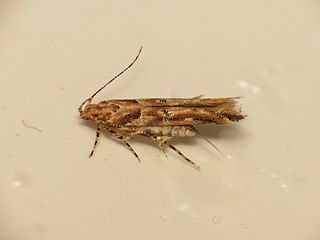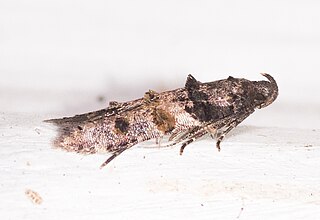The Cosmopterigidae are a family of insects in the order Lepidoptera. These are small moths with narrow wings whose tiny larvae feed internally on the leaves, seeds and stems of their host plants. About 1500 species are described. The taxonomic family is most diverse in the Australian and Pacific region with about 780 species.

Anatrachyntis is a genus of moths in the family Cosmopterigidae. Some authors include it in Pyroderces.
Anatrachyntis incertulella, the pandanus flower moth, is a small cosmet moth species. It belongs to subfamily Cosmopteriginae. This was the first "micromoth" species to be described from Hawaiʻi. The type specimens were collected there by the 1820s Beechey expedition and described by the English entomologist Francis Walker in 1864; they are now in the British Museum of Natural History.
Anatrachyntis rileyi, the pink cornworm, pink bud moth or pink scavenger, is a species of moth of the family Cosmopterigidae, the cosmet moths. It was first described by Lord Walsingham in 1882 from the southern United States, but it is probably an introduction to North America. It is found in much of the warm or tropical areas of the world, including northern Australia, the Galápagos Islands, Hawaii, the Antilles, South America and Mauritius.

Anatrachyntis badia, the Florida pink scavenger, is a species of moth of the family Cosmopterigidae. It was first described by Ronald W. Hodges in 1962. It is found in the southern United States from Florida to California and as far north as Maryland. It is an introduced species in Europe, where it has been recorded infrequently from Italy, Greece, Spain, Malta, the United Kingdom, Poland and Turkey through accidental importation in pomegranates. In Germany, it was first recorded in 2011 in a tropical greenhouse in a zoological garden, where caterpillars where found living in colonies of the mealybug Palmicultor lumpurensis on bamboo. It has also been recorded from Hawaii.
Cosmopterix pararufella is a moth of the family Cosmopterigidae. It is known from Spain, Greece, Corsica, Crete, Cyprus and North Africa, including Egypt.
Coccidiphila ledereriella is a moth in the family Cosmopterigidae. It is found in Southern Europe and on Malta, Sardinia and possibly the Canary Islands, North Africa and Asia Minor.
Anatrachyntis coridophaga is a moth in the family Cosmopterigidae. It is found in Egypt and Libya.
Anatrachyntis acris is a moth in the family Cosmopterigidae. It was described by Edward Meyrick in 1911, and is known from the Seychelles.
Anatrachyntis calefacta is a moth in the family Cosmopterigidae. It was described by Edward Meyrick in 1922, and is known from India.
Anatrachyntis coriacella is a moth in the family Cosmopterigidae. It was described by Snellen in 1901, and is known from Indonesia (Java), India, Malaysia, Mauritius, United States and Australia.
Anatrachyntis cyma is a moth in the family Cosmopterigidae. It was described by John David Bradley in 1953 and is known from Fiji.
Anatrachyntis euryspora is a moth in the family Cosmopterigidae. It was described by Edward Meyrick in 1922, and is known from Fiji.
Anatrachyntis falcatella is a moth in the family Cosmopterigidae. It was described by Henry Tibbats Stainton in 1859, and is known from India, China, Sri Lanka and Australia.
Anatrachyntis mythologica is a moth in the family Cosmopterigidae. It was described by Edward Meyrick in 1917, and is known from Sri Lanka.
Anatrachyntis philocarpa is a moth in the family Cosmopterigidae. It was described by Edward Meyrick in 1922, and is known from Iraq.
Anatrachyntis tripola is a moth in the family Cosmopterigidae. It was described by Edward Meyrick in 1909, and is known from South Africa.

Helcystogramma convolvuli, the sweet potato moth, sweetpotato webworm moth, sweetpotato leaf roller or black leaf folder, is a moth of the family Gelechiidae. It is mainly found in Asia and Africa, but there are also records from Oceania, the Middle East, the Caribbean and Florida in the United States. The species is also found on the Canary Islands and Madeira.

Walshia miscecolorella, the sweetclover root borer moth, is a moth in the family Cosmopterigidae. It was described by Vactor Tousey Chambers in 1875. It is found in North America, where it has been recorded from southern Canada south to Florida and Texas.
Pectinophora endema is a moth of the family Gelechiidae. It was described by Ian Francis Bell Common in 1958. It is found in Australia, where it has been recorded from Queensland and New South Wales.




